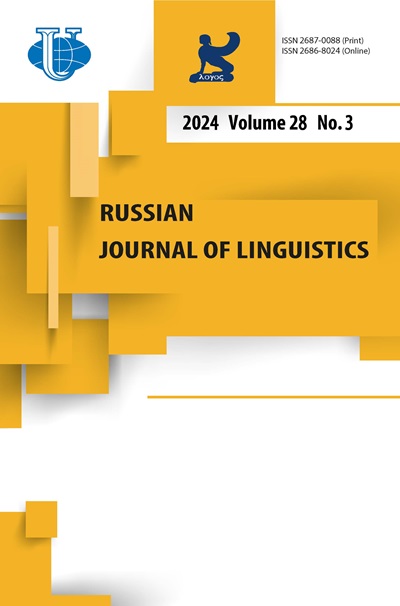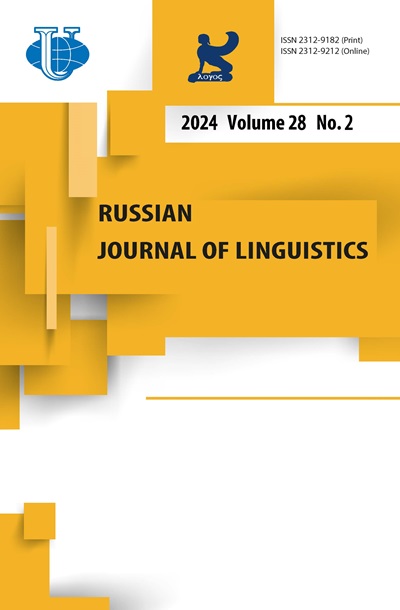Различие позитивности в лексиконах русского и английского языков: подход, основанный на больших данных
- Авторы: Соловьев В.Д.1, Ивлева А.И.1
-
Учреждения:
- Казанский федеральный университет
- Выпуск: Том 28, № 2 (2024)
- Страницы: 266-293
- Раздел: Статьи
- URL: https://journals.rudn.ru/linguistics/article/view/39433
- DOI: https://doi.org/10.22363/2687-0088-35624
- EDN: https://elibrary.ru/DFZGBB
Цитировать
Полный текст
Аннотация
В психологических кросс-культурных исследованиях давно замечены различия в степени позитивности мышления, или оптимизма, в различных культурах. Напрашивается вопрос, является ли преимущественная лингвистическая позитивность (linguistic positivity bias) одинаковой для разных языков или нет. В определенном смысле этот вопрос схож с гипотезой лингвистической относительности, касающейся влияния языка на когнитивную систему человека. Эта проблема рассматривалась только в одной работе (Dodds et al. 2015), в которой представлены данные о разной величине преимущественной лингвистической позитивности для разных языков и где сравнение для двух языков проводилось с использованием всего одной пары словарей. В настоящем исследовании мы существенно увеличиваем вычислительную базу, сравнивая английский и русский языки на основе 4 английских и 5 русских словарей. Сравнение проводится как на уровне лексикона языков, так и на уровне текстов разных жанров. Новой, ранее не использовавшейся идеей, является сопоставление рейтингов позитивности переводных текстов. Также словари английского и русского языков сравниваются по значениям рейтингов слов, устойчивых к переводу ( translation-stable words ). Результаты позволяют предположить, что на уровне лексикона русский язык несколько более позитивен, чем английский.
Ключевые слова
Об авторах
Валерий Дмитриевич Соловьев
Казанский федеральный университет
Email: maki.solovyev@mail.ru
ORCID iD: 0000-0003-4692-2564
доктор физико-математических наук, профессор, главный научный сотрудник НИЛ «Текстовая аналитика» Института филологии и межкультурной коммуникации Казанского федерального университета, Казань, Россия. Член президиума Межрегиональной ассоциации когнитивных исследований. Автор четырех монографий и более 60 публикаций по компьютерной лингвистике.
Казань, РоссияАнна Игоревна Ивлева
Казанский федеральный университет
Автор, ответственный за переписку.
Email: ivleva.anna.igorevna@yandex.ru
ORCID iD: 0000-0002-2670-6795
кандидат технических наук, старший научный сотрудник НИЛ «Лингвистика и искусственный интеллект» Института филологии и межкультурной коммуникации Казанского федерального университета, Казань, Россия. Основные сферы научных интересов: квантитативная лингвистика, обработка естественного языка, теория перевода.
Казань, РоссияСписок литературы
- Madhusudhan, Aithal & Tan Chenhao. 2021. On positivity bias in negative reviews. https://arxiv.org/pdf/2106.12056.pdf
- Bochkarev, Vladimir, Valery Solovyev, Timofei Nestik & Anna Shevlyakova. 2023 Variations in average word valence of Russian books in response to social change over a century. Proceedings of the Artificial Intelligence and Natural Language Conference. Zap. Nauchn. Sem. POMI 529. 24-42.
- Bradley, Margaret M. & Peter. J. Lang. 1999. Affective Norms for English Words (ANEW): Instruction Manual and Affective Ratings. Technical Report C-1, The Center for Research in Psychophysiology, University of Florida.
- Boucher, Jerry & Charles E. Osgood. 1969. The Pollyanna hypothesis. Journal of Verbal Learning and Verbal Behavior 8. 1-8. https://doi.org/10.1016/S0022-5371(69)80002-2
- Dodds, Peter Sheridan, Eric M. Clark, Suma Desu, Morgan R. Frank, Andrew J. Reagan, Jake Rylnd Williams, Lewis Mitchell, Kameron Decker Harris, Isabel M. Kloumann, James P. Bagrow, Karine Megerdoomian, Matthew T. McMahon, Brian F. Tivnan & Christopher M. Danforth. 2015. Human language reveals a universal positivity bias. Proceedings of the National Academy of Sciences 112 (8). 2389-2394. https://doi.org/10.1073/pnas.1411678112
- Dodds, Peter Sheridan & Christopher M. Danforth. 2010. Measuring the happiness of large-scale written expression: Songs, blogs, and presidents. Journal of Happiness Studies 11. 444-456. https://doi.org/10.48550/arXiv.1703.09774
- Dodds, Peter Sheridan, Kameron Decker Harris, Isabel M. Kloumann, Catherine A. Bliss & Christopher M. Danforth. 2011. Temporal patterns of happiness and information in a global social network: Hedonometrics and twitter. PLoS ONE 6 (12). e26752. https://doi.org/10.1371/journal.pone.0026752
- Folk, Dunigan & Elizabeth Dunn. 2023. How can people become happier? A systematic review of preregistered experiments. Annual Review of Psychology 75.
- Frank, Morgan R., Lewis Mitchell, Peter Sheridan Dodds & Christopher M. Danforth. 2013. Happiness and the patterns of life: A study of geolocated tweets. Scientific Reports 3. 2625. https://doi.org/10.1038/srep02625
- Gallagher, Matthew W., Shane J. Lopez & Sarah D. Pressman. 2013. Optimism is universal: Exploring the presence and benefits of optimism in a representative sample of the world. Journal of Personality 81 (5). 429-440. https://doi.org/10.1111/jopy.12026
- Gower, Tricia, Kimberly S. Chiew, David Rosenfield & Holly J. Bowen. 2023. Positive biases and psychological functioning during the coronavirus disease 2019 pandemic. Cognition and Emotion 37. 1-9. https://doi.org/10.1080/02699931.2023.2221022
- Hills, Thomas T., Eugenio Proto, Daniel Sgroi & Chanuki Illushka Seresinhe. 2019. Historical analysis of national subjective wellbeing using millions of digitized books. Nature Human Behaviour 3 (12). 1271-1275. https://doi.org/10.1038/s41562-019-0750-z
- Iliev, Rumen, Joe Hoover, Morteza Dehghani & Robert Axelrod. 2016. Linguistic positivity in historical texts reflects dynamic environmental and psychological factors. Proceedings of the National Academy of Sciences 113 (49). E7871-E7879. https://doi.org/10.1073/pnas.1612058113
- Jackson, Joshua Conrad, Joseph Watts, Teague R. Henry, Johann. M. List, Robert Forkel, Peter Mucha, Simon J. Greenhill, Russell D. Gray & Kristen A. Lindquist. 2019. Emotion semantics show both cultural variation and universal structure. Science 366 (6472). 1517-1522. https://doi.org/10.1126/science.aaw8160
- Jacobs, Arthur M., Berenike Herrmann, Gerhard Lauer, Jana Lüdtke & S. Schroeder. 2020. Sentiment analysis of children and youth literature: Is there a Pollyanna effect? Frontiers in Psychology 11. https://doi.org/10.3389/fpsyg.2020.574746
- Jaidka, Kokil. 2022. Cross-platform-and subgroup-differences in the well-being effects of Twitter, Instagram, and Facebook in the United States. Scientific Reports 12 (1). 3271. https://doi.org/10.1038/s41598-022-07219-y
- Ji, Li-Jun, Thomas. I. Vaughan-Johnston, Zhiyong Zhang, Jill A. Jacobson, Ning Zhang & Xiaoye Huang. 2021. Contextual and cultural differences in positive thinking. Journal of Cross-Cultural Psychology 52 (5). 449-467. https://doi.org/10.1177/00220221211020442
- Kassinove, Howard & Denis G. Sukhodolsky. 1995. Optimism, pessimism and worry in Russian and American children and adolescents. Journal of Social Behavior & Personality 10 (1). 157-168.
- Kay, Paul & Chad K. McDaniel. 1978. The linguistic significance of meanings of basic color terms. Language 54 (3). 610-646. https://doi.org/10.2307/412789
- Kirchner-Häusler, Alexander, Michael Boiger, Yukiko Uchida, Yoko Higuchi, A. Uchida & Batja Mesquita. 2022. Relatively happy: The role of the positive-to-negative affect ratio in Japanese and Belgian couples. Journal of Cross-Cultural Psychology 53 (1). 66-86. https://doi.org/10.3389/fpsyg.2020.01048
- Kloumann, Isabel M., Christopher M. Danforth, Kameron Decker Harris, Catherine A. Bliss & Peter Sheridan Dodds. 2012. Positivity of the English Language. PLoS ONE 7 (1). e29484. https://doi.org/10.48550/arXiv.1108.5192
- Koltsova, Olesya Yu., Svetlana V. Alexeeva & Sergey N. Kolcov. 2016. An opinion word lexicon and a training dataset for Russian sentiment analysis of social media. Computational Linguistics and Intellectual Technologies - Proceedings of the International Conference “Dialog” 277-287.
- Kotel’nikov, Evgeniy V., Elena V. Razova, Anastasiya V. Kotelnikova & Sergey V. Vychegzhanin. 2020. Modern sentiment lexicons for opinion mining in English and Russian (analytical survey). Informacionnye Processy i Sistemy 12. 16-33.
- Kulagin, Denis I. 2021. Publicly available sentiment dictionary for the Russian language KartaSlovSent. Computational Linguistics and Intellectual Technologies - Proceedings of the International Conference “Dialog” 20. 1106-1119.
- Kušen, Ema, Mark Strembeck & Mauro Conti. 2019. Emotional valence shifts and user behavior on Twitter, Facebook, and YouTube. Influence and Behavior Analysis in Social Networks and Social Media. 63-83. https://doi.org/10.1007/978-3-030-02592-2_4
- Larina, Tatiana & Douglas Mark Ponton. 2022. I wanted to honour your journal, and you spat in my face: emotive (im) politeness and face in the English and Russian blind peer review. Journal of Politeness Research 18 (1). 201-226.
- Liu, Bing. 2012. Sentiment Analysis and Opinion Mining. Springer.
- McKee, Gerard T., David D. Malvern & Brian James Richards. 2000. Measuring vocabulary diversity using dedicated software. Literary and Linguistic Computing 15 (3). 323-337. https://doi.org/10.1093/llc/15.3.323
- Mitchell, Lewis, Kameron Decker Harris, Morgan R. Frank, Peter Sheridan Dodds & Christopher M. Danforth. 2013. The geography of happiness: Connecting Twitter sentiment and expression, demographics, and objective characteristics of place. PLoS ONE 8 (5). e64417. https://doi.org/10.48550/arXiv.1302.3299
- Mohammad, Saif M. 2018. Obtaining reliable human ratings of valence, arousal, and dominance for 20,000 English words. Proceedings of the 56th Annual Meeting of the Association for Computational Linguistics (Volume 1: Long Papers). 174-184. https://doi.org/10.18653/v1/P18-1017
- Osgood, Charles E. 1952. The nature and measurement of meaning. Psychological Bulletin 49. 197-237.
- Pang, Bo & Lillian Lee. 2008. Opinion mining and sentiment analysis (English). Foundations and Trends in Information Retrieval 2. 1-135. https://doi.org/10.1561/1500000011
- Panou, Despoina. 2013. Equivalence in translation theories: A critical evaluation. Theory and Practice in Language Studies 3 (1). 1-6. https://doi.org/10.4304/tpls.3.1.1-6
- Reagan, Andrew J., Christopher M. Danforth, Brian F. Tivnan, Jake Ryland Williams & Peter Sheridan Dodds. 2017. Sentiment analysis methods for understanding large-scale texts: A case for using continuum-scored words and word shift graphs. EPJ Data Science 6. 1-21. https://doi.org/10.1140/epjds/s13688-017-0121-9
- Solnyshkina, Marina I., Valery D. Solovyev, Elzara V. Gafiyatova & Ekaterina V. Martynova. 2023. Text complexity as interdisciplinary problem. Voprosy Kognitivnoy Lingvistiki 1. 18-39. https://doi.org/10.20916/1812-3228-2022-1-18-39
- Solovyev, Valery, Musa Islamov & Venera Bayrasheva. 2022. Dictionary with the evaluation of positivity/negativity degree of the Russian words. In S. R. Mahadeva Prasanna, Alexey Karpov, K. Samudra Vijaya & Shyam S. Agrawal (eds.), Speech and computer. SPECOM 2022. Lecture notes in computer science, 13721, 651-664. Springer.
- Solovyev, Valery, Vladimir Ivanov. 2014. Dictionary-based problem phrase extraction from user reviews. In Petr Sojka, Alex Horák, Ivan Kopeček & Karel Pala (eds.), Text, speech and dialogue. TSD 2014. Lecture notes in computer science (including subseries lecture notes in artificial intelligence and lecture notes in Bioinformatics), LNAI, 8655, 225-232. Springer.
- Solovyev, Valery D., Marina I. Solnyshkina & Danielle S. McNamara. 2022. Computational linguistics and discourse complexology: Paradigms and research methods. Russian Journal of Linguistics 26 (2). 275-316. https://doi.org/10.22363/2687-0088-31326
- Tausczik, Yla R. & James W. Pennebaker. 2014. The psychological meaning of words: LIWC and computerized text analysis methods. Journal of Language and Social Psychology 29 (1). 24-54. https://doi.org/10.1177/0261927X09351676
- Tetior, Alexander N. 2015. The emotional sphere of a person: The predominance of negative emotions. Eurasian Union of Scientists 2 (11). 78-81.
- Warriner, Amy Beth, Victor Kuperman & Marc Brysbaert. 2013. Norms of valence, arousal, and dominance for 13,915 English lemmas. Behavior Research Methods 45. 1191-1207. https://doi.org/10.3758/s13428-012-0314-x
- Warriner, Amy Beth & Victor Kuperman. 2015. Affective biases in English are bi-dimensional. Cognition and Emotion 29 (7). 1147-1167. https://doi.org/10.1080/02699931.2014.968098
- Whorf, Benjamin Lee. 2012. Language, Thought, and Reality: Selected Writings of Benjamin Lee Whorf. In John B. Carroll, Stephen C. Levinson & Penny Lee (eds.). The MIT Press.
- Wierzbicka, Anna. 1992. The Russian language. Semantics, Culture and Cognition: Universal Human Concepts in Culture-specific Cofigurations. 395-441. New York: Oxford University Press.
- Yoonjung, Choi & Wiebe Janyce. 2014. +/-EffectWordNet: Sense-level lexicon acquisition for opinion inference. Proc. of EMNLP. 1181-1191. https://doi.org/10.3115/v1/D14-1125
- Hedonometer (English). Retrieved from https://hedonometer.org/words/labMT-en-v2/ (accessed 18 March 2024).
- BRM. Retrieved from https://github.com/meadej/twitter-sentiment-analysis?ysclid=lh0bctge 6l466946169 (accessed 18 March 2024).
- ANEW. Retrieved from https://github.com/eriq-augustine/sentiment-data/blob/master/anew.csv (accessed 18 March 2024).
- NRC-VAD. Retrieved from https://emilhvitfeldt.github.io/textdata/reference/lexicon_nrc_vad.html (accessed 18 March 2024).
- KFU Sentiment. Retrieved from https://kpfu.ru/tehnologiya-sozdaniya-semanticheskih-elektronnyh.html (accessed 18 March 2024).
- KFU Sentiment BERT. Retrieved from https://kpfu.ru/tehnologiya-sozdaniya-semanticheskih-elektronnyh.html (accessed 18 March 2024).
- KartaSlovSent. Retrieved from https://kartaslov.ru (accessed 18 March 2024).
- Hedonometer (Russian). Retrieved from https://hedonometer.org/words/labMT-ru-v2/ (accessed 18 March 2024).
- LinisCrowd. Retrieved from http://linis-crowd.org/ (accessed 18 March 2024).

















